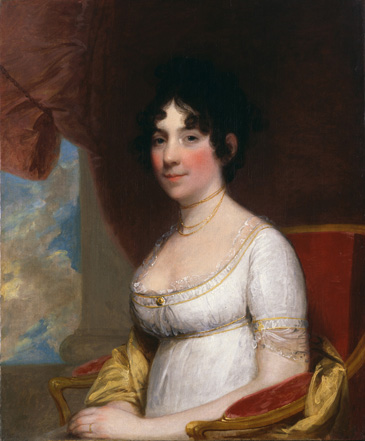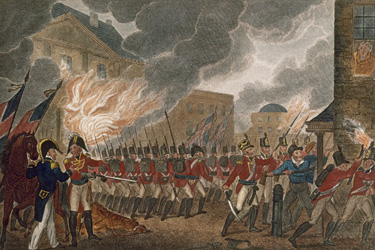As Madison began his second term in the spring of 1813, Secretary Gallatin warned him: “We hardly have enough money to last till the end of the month.”
James Madison was a quintessentially practical man who enlisted the advice of seasoned soldiers, proving himself in the end a war president who understood power, reacted with composure to the hostility of his domestic enemies, and saved face.
The War on Land and Sea

White House Historical Association (White House Collection)
On the ground, the Americans did not perform well either. The early effort to drive into Canada, through Detroit, turned into a rout. Michigan’s territorial governor, William Hull, a colonel in the Revolution, failed miserably. Monroe called him “weak, indecisive, and pusillanimous,” while hopeful that the embarrassment would “rouse the nation” and ultimately lead to victory. He was echoing the president’s position when he said: “We must efface the stain before we make peace, & that may give us Canada.”
The United States saw better prospects on the water. Naval commanders proved indefatigable and aggressive; the most celebrated, Stephen Decatur, ranged farthest. He fought and defeated a British frigate east of the Canary Islands and brought it home as a prize of war; a lieutenant showed up in Washington, DC, and laid its flag at the feet of first lady Dolley Madison.
Within Madison’s cabinet, an ineffective secretary of the navy was replaced with a former ship’s captain, William Jones, who encouraged privateers to harass British vessels. Jones organized a massive shipbuilding effort on the shores of Lakes Erie and Ontario. Madison strongly favored an enlarged navy, and he recognized that he would have to adjust Republican cost-saving measures to accomplish this end. Ironically, in order to prosecute the war more fully, the Madison administration adopted a number of policies earlier championed by the Federalists, such as investing in bigger and better ships, re-chartering the national Bank, and increasing the national debt.
Even so, by the time of the British attack on Washington in August 1814, when the president’s house and the Capitol were both put to the torch, the nation no longer understood what the war was meant to accomplish. Canada was not to be taken. Little, indeed, was to be gained. In Europe, American negotiators John Quincy Adams, Albert Gallatin, and yes, the war hawk Henry Clay, fought tooth and nail to secure a just peace along with a return to status quo ante bellum (the state that existed before the war). The treaty signed on December 24, 1814, was, in effect, an indefinite end to an indefinite war.
The Legacy of James Madison

Library of Congress, Prints and Photographs Division.
Andrew Jackson’s sensational victory at the Battle of New Orleans on January 8, 1815, before the Treaty of Ghent was received in Washington, proved to be a particular point of pride. President Madison reaped unexpected benefits from the final outcome. “The tools of royalty have never ceased prating against the imbecility and weakness of republics,” a Rhode Island newspaper proclaimed. “Where are these false prophets now? The republic is safe.” The president allowed publication of a semiofficial white paper, which he coauthored with Pennsylvanian Alexander James Dallas, his new secretary of the treasury and a close ally of Gallatin’s. It justified the administration’s actions, step by step, and indicted the British for barbarism.
The president, historically portrayed as mild and modest, and never known for defending himself before posterity, was intent on having the public record reflect the correctness of his course as commander-in-chief. He did not possess the eloquence of his friend Jefferson, but one Pennsylvania senator, who spent a good deal of time in his company in the gloomy year of 1814, said of him that he remained cheerful, despite the trials of war, maintaining the composure that “ever became a great man.”
To us, a slightly different picture emerges: James Madison exhibited open-mindedness when many around him held petty, rigid views. A man who never once left American shores in his 85 years, he knew his limitations when it came to military planning. He was, then, a quintessentially practical man who enlisted the advice of seasoned soldiers, proving himself in the end a war president who understood power, reacted with composure to the hostility of his domestic enemies, and saved face.
Part of a series of articles titled Madison, Party Politics and the War of 1812 .
Last updated: March 6, 2015
